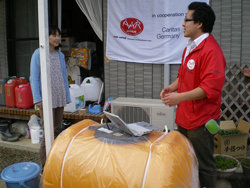By Yasushi TANAKA, Ryo OIKAWA, Akiko KATOH | Emergency Relief Team Tohoku, Tokyo HQ
The following are excerpts from our English blog which highlight some of AARJ's work in Tohoku in the past few weeks. To find a complete list of articles, visit our English blog at http://aarjapan.blogspot.com.
In its continuing efforts to provide aid and relief to survivors of the Great East Japan Earthquake, on May 19 AAR JAPAN delivered electric cookers, electric kettles, garbage bags, towels, underwear, socks, and snacks to Senior Garden, a facility for the elderly in Fukushima City, and Ekuseru, a group home in Soma City, both in Fukushima Prefecture. The following report contains details for each.
Finding Shelter After the Storm: The difficult search for a new home for the residents of Senior Garden
Senior Garden is a group home for the elderly who suffer from dementia which operated in Tomioka Town, Futaba County in Fukushima Prefecture. Located just 9km from the Fukushima Dai-ichi nuclear power plant, the residents and staff were required by the government to evacuate to a noodle restaurant in Kawauchi Village in the same county. In Kawauchi however residents were on orders to remain confined to their houses, but for the uprooted residents of Senior Garden, staying together in big evacuation sites was difficult. Fukushima Prefectural Group Home Council for Dementia assisted the seniors by finding them an apartment in Fukushima city to rent out and use as a group home. Starting March 22, fifteen people have been receiving continuous care in the home.
For elderly individuals with dementia, even small environmental changes can induce great stress. The trauma of the evacuation had emergency-level medical consequences for some. A 70-year-old man, one of the residents of Senior Garden, suffered a hemorrhage due to a stomach ulcer, causing him to vomit and discharge blood. With his blood pressure falling, he was immediately taken to a hospital, but it his admittance and care was delayed until he was given a screening test for exposure to radiation.
Yasuhiro SUZUKI, Managing Director of Senior Garden, and his wife Yoko, Executive Director, are committed to overseeing the facility. Ms. Yoko SUZUKI said, “This group home is a second family for us. We don’t know when we can go back to Tomioka Town, but we’ve been trying to keep our spirits up, and are determined that we will remain at the sides of those whom we are caring for, even as they pass on.” Despite this determination, two residents are currently receiving care in a professional hospital, and it is clear that living as evacuees has undermined the health of many residents, and it is clear that despite the staff's best efforts, they are undersupplied and understaffed. AAR Japan has responded by supplying food and goods to support the continued operation of the new Senior Garden.
While I had a chance to witness the improvement AAR's supplies had on the conditions in which the staff and residents of Senior Garden lived, I realized it was in the smiles and warm words they exchanged that each found a reason to persevere in the face of this disaster. In their hearts was a greater medicine greater than anyone could ever provide.
The Fukushima Fallout: Nuclear accident continues to disrupt aid to Fukushima prefecture.
Ekuseru is a group home for people with dementia in Soma City. It is located 37km from the Fukushima Daiichi nuclear reactor, and is now taking care of 9 elderly people, including 3 who are bedridden.
In the aftermath of the Fukushima Daiichi incident, supplies have been slow to arrive in the region. In the summer, temperatures can rise as high as 33°C (91°F), and in the face of electricity shortages, the staff of Ekuseru continues to worry how they will mange in the summer heat. While other people have relocated, drastic environmental change can cause panic among for the residents of Ekuseru, which can have serious medical consequences (as happened in the case of the Senior Garden).
The situation at Ekuseru embodies much of the anxiety that afflicts the entire the seacoast of Fukushima prefecture, where persisting concerns over the nuclear power plant, radiation, evacuation orders, and insufficient supply distribution continue to plague the population. Today’s visit helped show us how this anxiety particularly troubles the staff and residents of welfare facilities, who are left with little other choice but to desperately wait for outside aid to arrive.
It is to this cause AAR Japan is committed: to continue our efforts to provide aid for hard-to-reach people, like those at Senior Garden and Ekuseru, and to ensure that relief finds it's way to those most in need of help.
AAR JAPAN delivered drinking water, a water tank, and diapers to Ms. Chiba, who has been living as an evacuee on the outskirts of Kesennuma City in Miyagi Prefecture. Residents in the area once drew their water from the town well, but the water has become undrinkable after the tsunami contaminated it with seawater and heavy oil. A temporary waterworks was set up at a local stream, but residents had to trek for nearly an hour to retrieve their water for the day.
Water tanks like the one AAR has provided to Ms. Chiba will give residents to have access to a stable reservoir of water when deliveries are delayed and emergencies necessitate immediate access. After the exhausting task of installing the tank, Ms. Chiba and I looked upon a still untouched heap of rubble near her house. It is clear that despite progress, there is still much work to be done.
(Reporter: Takeshi ABE at Sendai office)
Making use of wood buried in rubble to stimulate independent recovery
Murakami Sawmill has supported the carpenters in Rikuzen-Takata City in Iwate Prefecture for a long time, and once again is coming to the rescue with a plan to put carpenters back to work while helping the survivors of the tsunami find comfort in their new homes. Murakami has provided shelter for the carpenters who have lost their homes and workplaces, and in turn is having them recycle wood from the rubble of destroyed buildings to make benches and furniture for residents moving into temporary housing. The carpenters of Kikuzen-Takata have worked hard in their free hours to craft these benches, and will provide them to residents with no charge.
These benches offer a small glimpse at normalcy for the survivors, and as Iwate begins the long process of reconstruction, these benches perfectly embody this rebuilding sentiment. Murakami hopes that the benches can help connect the survivors to each other into the coming summer.
While AAR JAPAN continues to provide relief and support to the area, it is clear that the people of Iwate are beginning to find their own ways to rebuild. AAR JAPAN will continue to support these survivors as face forward and take their first steps towards recovery. (Reporter: Yuka YOKOTA at Morioka office)
May 27th - Yuka YOKOTA, AAR JAPAN (right), is interviewing Mr. KIN, a carpenter who has been sheltered at Murakami Sawmill after his workplace and house were swept away by the tsunami. (Rikuzen Takata City, Iwate Prefecture)
Widening the Circle of Support Hand-in-Hand with Local Communities
Yamada Kyosei Workshop (Yamada Town, Iwate prefecture) has served as a supply distribution base for the elderly and persons with disabilities in the area. Regular patrons of the supply center include a person with a mental disability who lives alone deep in the mountains, a person with a visual impairment whose shop and house were completely destroyed, and an 83-year-old woman who has been is running her own shop out of a shed, which doubles as her home.
For suvivors who have been able to remain in their homes, it is not easy to understand the difficulties which evacuees face, especially by those who are elderly or have disabilities. We hope to widen the circle of support for these people with the help of companies like Yamada Kyosei Workshop. Mr. SATO, chief of Yamada Kyosei, said, “We would like to keep close contact with AAR JAPAN and cooperate to support people who have been in trouble in their houses in Yamada area.”
(Reporters: Ryo OIKAWA and Teruyo MIYAGAWA at Morioka office)
May 31st – Ryo OIKAWA (right end) and Teruyo MIYAGAWA (left end) delivered food such as vegetables and fruits to Mr. Sato, Chief of Yamada kyosei workshop. (Yamada Town, Iwate Prefecture)
AAR JAPAN has operated a series of soup kitchens throughout the Tohoku prefectures, and to date has distributed over 16,500 meals at 26 locations in Fukushiuma, Iwate, and Miyagi prefectures.
The following stories relate to soup kitchen operations from April 30 to May 7 (during Golden Week) at Seiyukan (a welfare facility in Ishinomaki City, Miyagi Prefecture), Osawa Furusato Center, Osawa Elementary School and Yamada Town Hall (the last three in Yamada Town, Iwate Prefecture).
This is a report from Akiko KATOH, who worked in the soup kitchen at Seiyukan.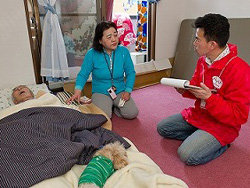
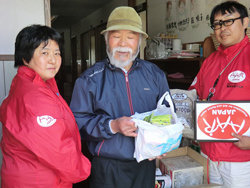
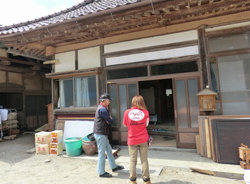
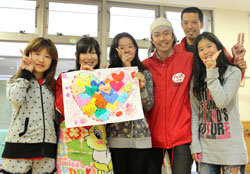
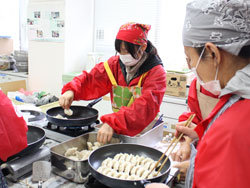
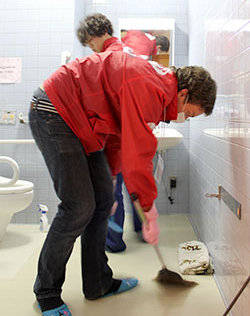
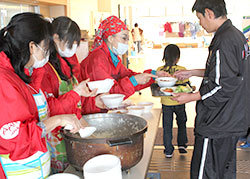
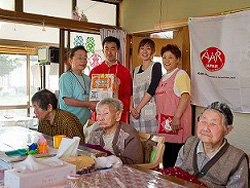
Links:
Project reports on GlobalGiving are posted directly to globalgiving.org by Project Leaders as they are completed, generally every 3-4 months. To protect the integrity of these documents, GlobalGiving does not alter them; therefore you may find some language or formatting issues.
If you donate to this project or have donated to this project, you can receive an email when this project posts a report. You can also subscribe for reports without donating.
